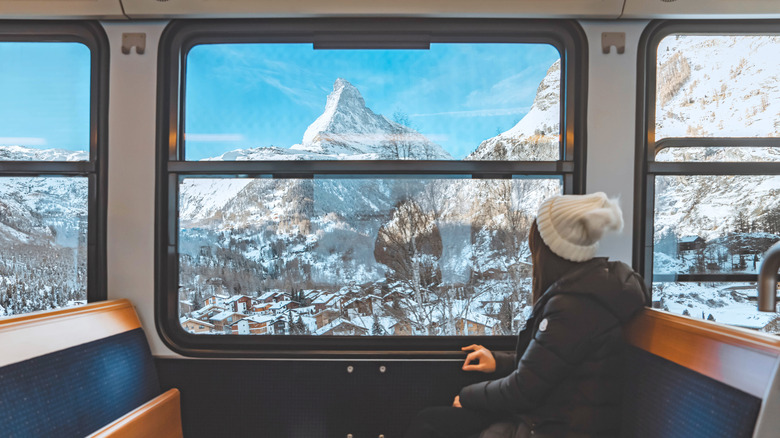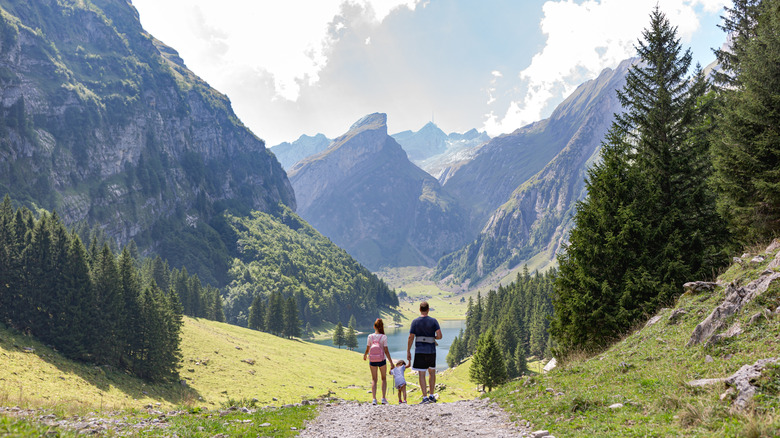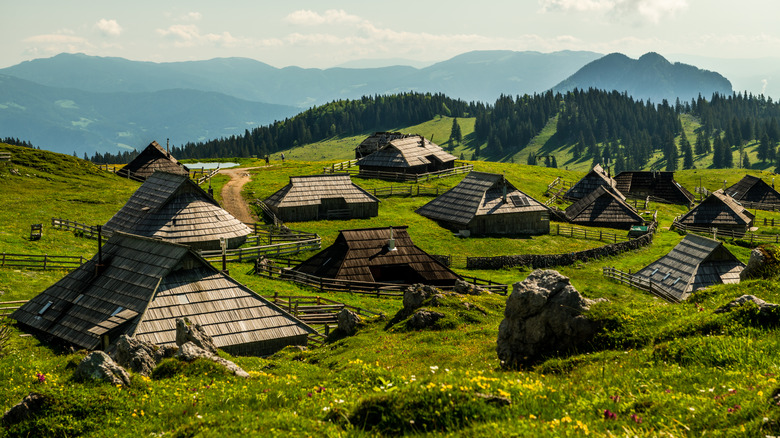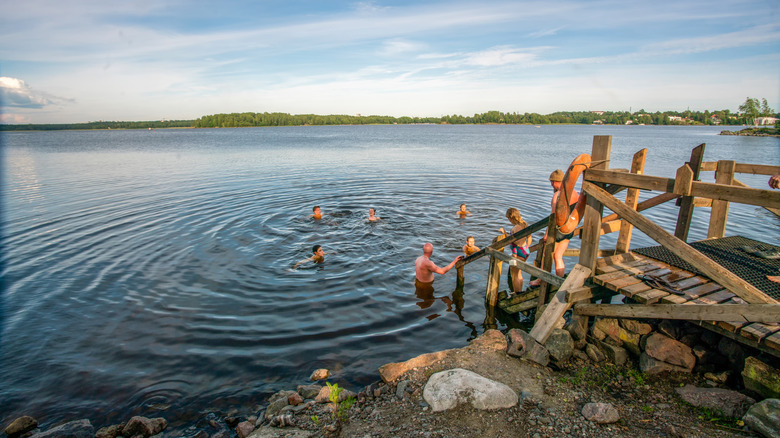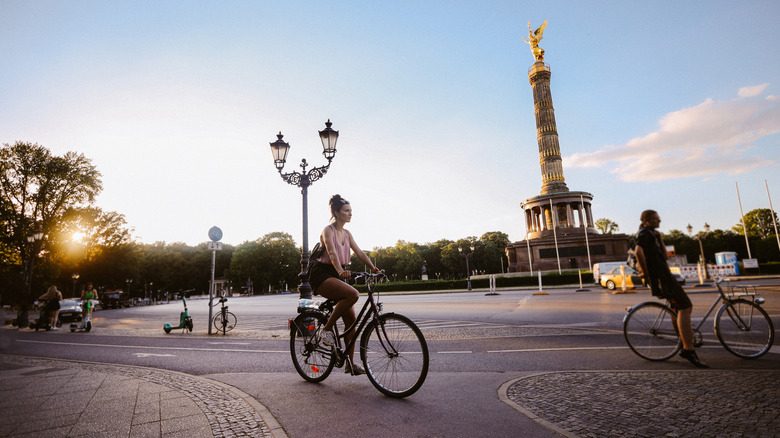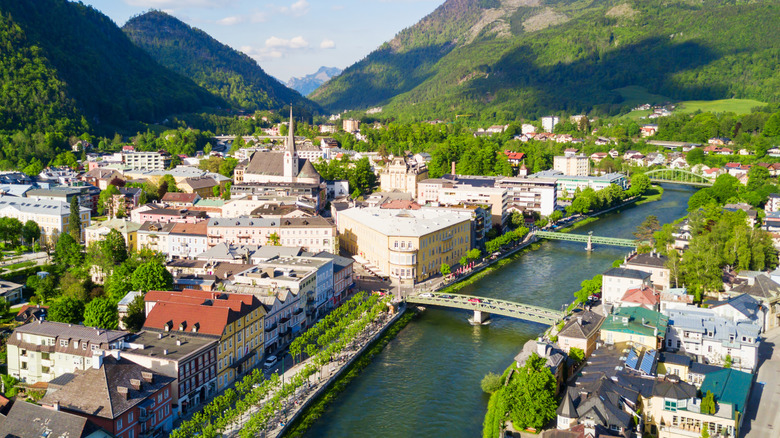If Japan Is Too Crowded, These Unexpected Destinations In Europe Can Tick All The Same Boxes
Famously known for its intriguing blend of modernity and tradition, Japan has drawn many a tourist to its shores, and with good reason. Between its unique culinary offerings, reliable transportation system, and a rich variety of natural landscapes, Japan is also much appreciated for its safety, rightfully earning its ranking as the safest Asian country to visit in 2025 by a survey launched by Berkshire Hathaway Travel Protection.
Unfortunately, the appreciation for this lovely archipelago has been overwhelming. While international tourists flock to its shores, the number of domestic travelers has dwindled not only because of economic reasons, but also due to the sheer volume of crowds at its famous tourist sites such as Kyoto, one of the world's most beautiful destinations that has sadly been ruined by overtourism. There are, of course, workarounds to the hustle and bustle, like heading to laidback, culture-rich Nara to avoid Tokyo crowds, or strategically plotting the best time to visit Japan depending on what you want to experience. But travelers are also setting their sights on unexpected European destinations that echo Japan's overall vibe and experience — and with much less elbow-jostling at that. The sushi may not be as fresh, but these European spots tick enough of the same boxes to tide you over until your next Japan trip.
Switzerland matches Japan's precision, punctuality, and Alpine landscape
Switzerland may not be an unexpected pick as a Japan-like travel destination, as it shares strong parallels with its Asian counterpart when it comes to aesthetics, lifestyle, and culture. While major Japanese cities can be heaving with crowds, Swiss cities can offer a calmer and more relaxed atmosphere without sacrificing urban amenities. "For a Japan-like experience, I'd recommend Switzerland," a Reddit user commented in a thread about suitable substitutions for Japan. "It's got stunning nature, efficient public transport, and is very safe."
Like the Swiss' meticulousness in watchmaking and the Japanese's intricate origami, these two countries have more in common than you'd think. Landscape-wise, both destinations are rich with mountains, lakes, and forests. The Japanese Alps of central Honshu were named as such by 19th-century British engineer William Gowland for its resemblance to the European Alps, most famously represented by the spectacular Swiss mountain range, though Japan's peaks aren't as high. Quaint mountain towns like Nagano's Kamikochi, with their verdant nature and abundance of hiking trails and wildlife, are reminiscent of Switzerland's Zermatt. Switzerland, like Japan, has a transit system that operates like clockwork, efficiently transporting you from one place to another.
"I have always had the impression that Japan and Switzerland are very alike. Clean, safe, well educated and mannered — tons of nature and everybody's dream destination. Just expensive. And to be fair, Switzerland is expensive to Americans and Europeans the way that Japan is expensive to other Asian cultures," writes another Reddit user in the same thread.
Slovenia shares Japan's slipper and festival culture
Slovenia is one of Europe's most unexpected charmers that definitely delivers a vibe similar to Japanese cultural experiences minus the overwhelming crowds. The natural landscape is the strongest connection between these two countries. Home to mountains, large expanses of woodland, and stretches of fields, Slovenia's terrain remarkably resembles Japan's. The small footprint of Ljubljana gives travelers the convenience of an easily navigable city, and its relative peacefulness makes it a joy to discover. The Institute for Economics & Peace even ranked Slovenia as the ninth most peaceful country in the world in their 2024 Global Peace Index.
In addition to geographic highlights like its national and city parks, forests, and the famous Lake Bled, the Slovenes also have small cultural habits that mirror those of the Japanese, like wearing slippers at home and an ardent love for festivals. "Most people know of Japan's strict ”slippers only, when indoors' policy, which is well documented," BregHouse.com writes in a blog post. "Just like in Japan, every Slovenian home has a stash of slippers at the door for guests, and walking into a home in your outdoor shoes is most certainly a faux pas." Concerning festivals, BregHouse.com says, "Japan and Slovenia both love a festival. Neither nation needs much excuse to dress up, play music and parade, and even the smallest towns have found something to celebrate."
Like Japan, Finland embraces minimalism, saunas, and karaoke
While Finland likely isn't the first country to pop into your mind, you'd be surprised at its cultural, natural, and societal similarities with Japan once you dig a bit deeper. Teeming with natural parks, crystal-clear lakes, dramatic mountain views, and saunas, Finland's natural landscape echoes that of Japan's most famous winter destination, Hokkaido, but with noticeably fewer crowds. Hokkaido drew in 6.1 million tourists in 2023, almost 5 million more than Lapland's 1.5 million visitors that same year.
"Finland is one of the most 'Japanese-feeling' places outside of Japan with its pristine orderliness, sleek minimalism, and harmony with nature," shares a Redditor. Finland's reliable public transportation system adds extra convenience to Helsinki's walkability, while railways easily connect to other scenic cities or national parks as well. And if you're a fan of the Japanese onsen, you won't find this lacking in Finland. "Japanese onsen (hot spring) culture and Finnish sauna culture are very similar," writes another Reddit user. "Both onsen and sauna are hot places used for relaxation and recreation... In an onsen, you traditionally wash yourself using a bucket and a scoop, which is similar to a Finnish summer cottage sauna experience."
Finland, like Japan, is a high trust society that values discretion, discipline, and cleanliness, which makes it a safe tourist destination. Both countries share an understated and minimalist design aesthetic. If karaoke is your jam, you're in luck: like the Japanese, the Finns nurture a surprising love for karaoke. Some even cite similarities in cuisine. "Strong spices are rarely used and we both appreciate fresh high quality ingredients. Popular seasonings are salt (soy sauce), pepper, garlic, ginger. Good fresh fish is always good, although in Finland we don't really have any other seafood," observes another Reddit user in the same thread.
Germany rivals Japan's efficiency and discipline
"I was near Sapporo for 10 days and now I'm road tripping through Germany and they are really similar weather and scenic wise," a Reddit user wrote in a thread discussing German and Japanese similarities, and we don't doubt it: There may be more of Japan in Germany than meets the eye. Home to the Bavarian Alps, a rich tapestry of forests, lakes, and stunning national parks, Germany's diverse natural resources match those of Japan, and are made accessible through a comprehensive and fairly reliable network of regional trains, bus lines, and the Deutsche Bahn. The walking and cycling culture is also as prevalent in Berlin as in Tokyo, with well-designed bike routes and pedestrian zones. And while its capital, like Tokyo, is a bustling metropolis, you can still experience Berlin's urban magic in Germany's mid-size cities — with fewer crowds and lower prices, to boot.
Culturally, both countries follow societal cues that are rooted in discretion and order. "Very similar trash/refuse/rubbish culture where the individual takes greater responsibility for managing and separating their trash for recycling," observes another Redditor. Another Reddit user wrote that people of both cultures prefer silence during train rides.
Austria challenges Japan's spa game
There are certain aspects of Austria that bear unexpectedly striking resemblances to the Asian archipelago. Like Japan, Austria has breathtaking natural landscapes including lakes, waterfalls, pristine mountains. Even spa-studded Baden bears similarities with Japan's most visited onsen destination, Kinosaki Onsen. Compared to Tokyo, Vienna — aided by its smaller size and population — remains delightfully uncrowded. "It's all relative, but having lived in a few other major cities I'd say Vienna is less crowded than most," a Redditor writes. "Places are rarely crowded and I usually don't need to queue for long."
The Viennese public transport, while on par with Japan's affordable, frequent, and efficient subway system, doesn't get as congested. "Don't get me wrong, it's crowded, but not crazy megapolis crowded. Like, your chest doesn't get pushed enough that you hardly breath or you don't have to wait to enter the station," writes another Reddit user.
Though no country is completely crime-free, Austria offers tourists a relatively safe and relaxed environment, emphasized by fewer burglaries, car thefts, and cybercrimes in 2024 than in 2023, as reported by ORF.at. This overall sense of security, paired with an abundance of cultural and architectural gems, earned Vienna the title of World's Most Liveable City of 2024, according to the Economist Intelligence Unit's Global Liveability Index (Osaka tied with Auckland for ninth place).
